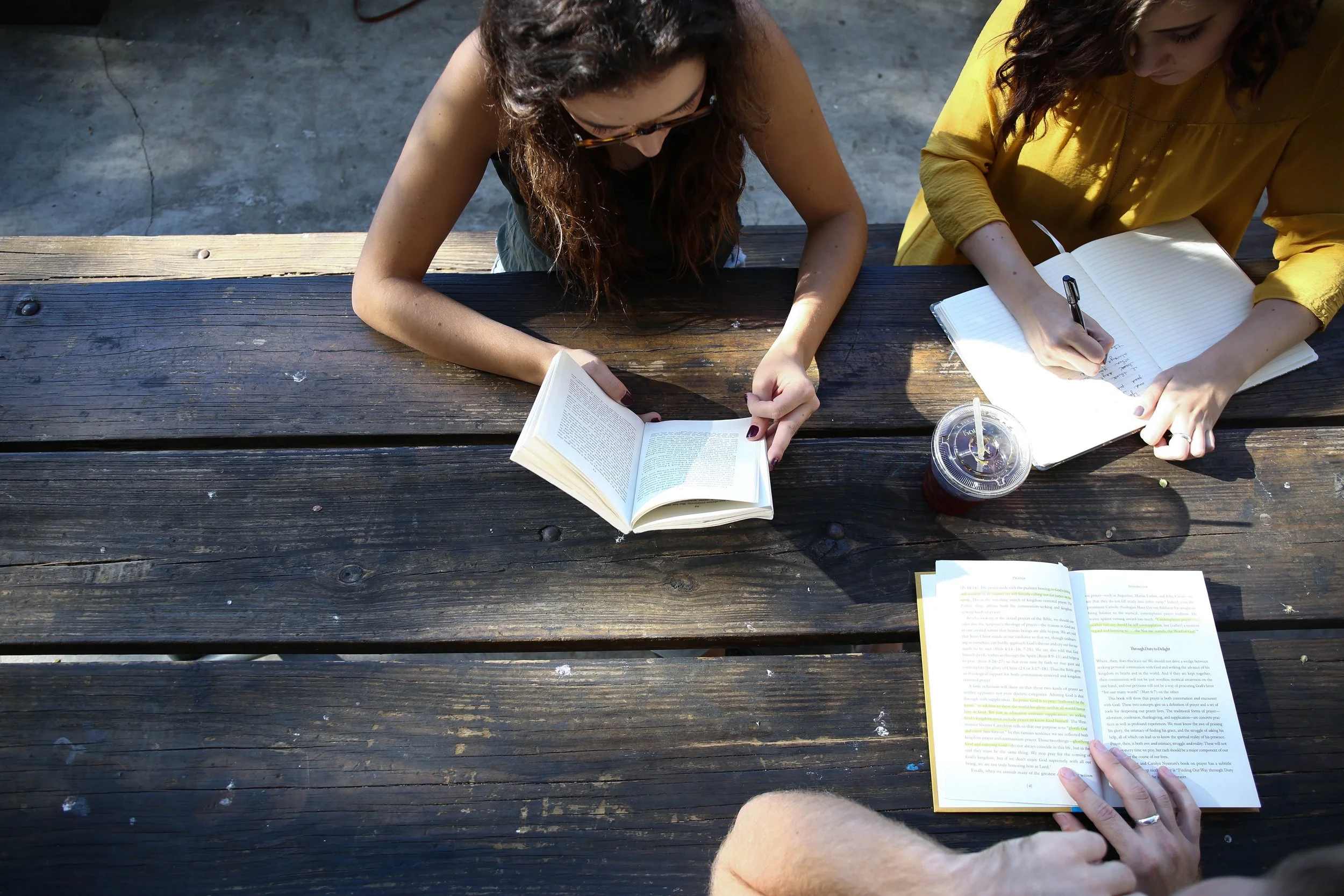How Talking to Classmates Helped Me Understand Hard Topics
So like, I gotta be real with you. When I first started high school here in Ontario, I thought studying was something you just did alone in your room. You know, textbooks open, notes everywhere, trying to memorize everything the teacher said. But honestly? That never really worked for me. I would read the same page like five times and still not get what was happening, especially in subjects like chemistry or math.
Everything changed when I started actually talking to my classmates about homework. Not just copying answers or whatever, but like really discussing the problems and trying to figure them out together. I remember this one time in Grade 9 science when we had this super confusing unit about chemical reactions. I was totally lost. My teacher explained it, but the way she talked was so technical that my brain just could not process it. Then my friend Marcus explained it to me using stuff we actually know about, like cooking or why pop fizzes when you shake it. Suddenly it all made sense.
That is when I realized something important. Sometimes your friends can explain things way better than teachers do because they are learning it at the same time as you. They know which parts are confusing because they were confused too. They use words and examples that make sense to people our age instead of using all that formal language from textbooks. Plus, when you are talking to a friend, you feel way more comfortable asking questions that might sound dumb. Like, I would never raise my hand in class to ask what an atom actually is, but I will definitely ask my study group.
Working together on homework made difficult subjects actually make sense to me. Now I actually look forward to group study sessions because I know I will understand things better. And the crazy part is that explaining stuff to other people helps me understand it even better myself. It is like teaching someone else forces your brain to really organize the information properly.
Why Friend Explanations Hit Different
Okay so here is the thing about how teachers explain stuff versus how your classmates do it. Teachers are super smart, right? They know everything about their subject. But sometimes that is actually the problem. They have been understanding this stuff for so long that they forget what it is like to not get it. They use big words and complicated examples because to them, it all seems obvious.
But when your friend explains something, they just learned it like yesterday. They remember exactly which part was confusing. They know which example the teacher used that did not help at all. And most importantly, they explain it using language that normal people actually use. Like, my friend Aisha explained probability to me using Tim Hortons Roll Up the Rim instead of all those marble-in-a-bag examples from the textbook. That made way more sense because I actually care about winning free donuts.
Another thing is that friends are not scared to say when they do not know something. Teachers sometimes act like everything should be obvious, which makes you feel bad when you are confused. But when you are studying with classmates, everyone admits what they do not understand. Someone will be like "wait, I have no idea what this word means" and then you realize you did not know either. So you all look it up together and nobody feels stupid about it.
The Power of Different Perspectives
One of the best parts about studying with other people is that everyone thinks differently. Like, in math class, there might be three different ways to solve the same problem. The teacher usually shows you one way, but maybe that way does not click with your brain. When you work with classmates, someone might solve it completely differently, and their method might make way more sense to you.
I remember struggling so hard with algebra in Grade 10. The teacher would always solve for x by doing all these steps that I could never remember. But my classmate Devon showed me how he visualizes it like a balance scale, where you have to keep both sides equal. That one explanation helped me more than like two weeks of class. Now I actually understand why you do those steps instead of just memorizing them.
Group Study Sessions That Actually Work
Not all group studying is helpful though. Sometimes you get together with friends and just end up talking about video games or scrolling through TikTok. I learned pretty quick that you need some kind of structure or it just turns into hanging out without actually learning anything. Here is what works for me and my study group.
First, we actually pick a specific topic or assignment to work on. Like we will text each other and say "study session Thursday after school, bringing chemistry homework and those practice problems from chapter seven." That way everyone comes prepared and knows what to expect. If you just say "let's study sometime" it never happens, or if it does, nobody brings the right stuff.
We usually meet at the public library near our school because at home there are too many distractions. Plus the library has those group study rooms you can book, which is perfect. We tried studying at coffee shops but it is too loud and the wifi is always slow when you need to look stuff up. The library just works better, and it is free which is important when you are a student.
How We Actually Run Our Sessions
So we start by everyone sharing what they found most confusing. Like we will go around and each person says "I do not understand question five" or "I have no idea what this chapter was even about." Then we try to help each other with those specific things. Usually someone in the group understood that part better and can explain it.
If nobody gets something, we look it up together. YouTube is honestly amazing for this. There are so many good educational channels that explain things in different ways. Sometimes we will watch a video together and then discuss it. Or we will find examples online and work through them as a group. The important thing is that we are all trying to figure it out together instead of just giving up.
We also quiz each other, which sounds boring but actually helps a lot. Someone will read a question and everyone tries to answer it. Then we discuss why the answer is what it is. This helps way more than just reading notes because you have to actually recall the information from your brain. Plus it shows you what you still need to study more.
Learning By Teaching Others
Here is something weird I discovered. When I explain something to someone else, I understand it way better myself. Like, you think you get a concept until you try to teach it to your friend and realize you actually do not know it as well as you thought. This happened to me with physics last year.
I thought I totally understood Newton's laws of motion. I could answer the multiple choice questions fine. But then my friend asked me to explain it to her, and I realized I had just memorized some facts without really understanding how it all connects. When I tried to explain why things work the way they do, I got stuck. So we figured it out together by looking at examples and really thinking about it.
Now when I study, I pretend I am going to teach it to someone. I will literally talk out loud in my room like I am explaining it to a friend. My mom thinks I am weird but whatever, it works. If I can explain something clearly in my own words, then I actually understand it. If I get confused trying to explain it, that tells me I need to study that part more.
Building Confidence Through Discussion
Talking about school stuff with classmates also made me way more confident. Before, I would sit in class thinking I was the only one who did not understand. I was too embarrassed to ask questions because I thought everyone else got it. But when you study with other people, you realize that everyone struggles with different things. The person who is amazing at math might struggle with English. The person who finds science easy might hate history.
This made me feel so much better about asking questions in class. Now I know that if I am confused, probably other people are too. And teachers actually appreciate when you ask questions because it helps them know what to explain better. My English teacher literally said that questions make class more interesting for everyone.
Making Study Groups Work For Different Subjects
Different subjects need different approaches for group studying. Like, math and science work really well for group study because there are specific problems to solve. You can work through them together and check your answers. Everyone can try solving something and then compare methods.
For these subjects, we usually bring practice problems or homework questions. We work on them individually for a bit, then come together to compare answers. If people got different answers, we figure out where the mistake happened. This is super helpful because you learn from seeing other people's mistakes too, not just your own.
English and history are different though. For these, we usually discuss the readings or brainstorm essay ideas together. Like if we all read the same chapter of a novel, we will talk about what we think it means. Everyone has different interpretations and that helps you understand the book deeper. Plus it makes reading less boring when you know you will discuss it with friends later.
Online Study Groups During Bad Weather
Living in Canada means winter is brutal sometimes. There are days when nobody wants to leave their house because it is like minus thirty degrees. That is when online study groups are perfect. We use Discord or FaceTime and just study together virtually. It is not quite as good as being in person, but it still helps a lot.
We share screens to show each other problems or documents. We can still explain things verbally and ask questions. Sometimes we will all be on video just doing homework together, which sounds pointless but actually helps you stay focused. If everyone else is working, you feel motivated to work too instead of getting distracted.
The online format also makes it easier to include people who live far away or have busy schedules. Like my friend who lives across town can join without having to take two buses. And we can have shorter sessions because nobody has to travel. Sometimes we just do a quick thirty minute session to review before a test.
Real Examples From My Experience
Let me tell you about some specific times when studying with classmates really saved me. In Grade 10, I had this history project about Confederation. I was so confused about all the different perspectives and why the provinces joined Canada at different times. The textbook made it seem so boring and complicated.
My study group decided to make it into like a story. We each researched one province and then explained to the group why that province did or did not want to join Confederation at first. We made it kind of funny and dramatic, like we were the actual politicians arguing about it. This made the whole thing memorable and interesting. I actually remember that information now, whereas normally I forget history stuff right after the test.
Another time was in chemistry when we had to learn about electron configurations. That stuff is so confusing with all the numbers and letters. But my classmate made up this weird song about the orbital order, and now I cannot forget it even though the test was months ago. Sometimes the stupidest methods work the best for remembering things.
When Group Study Saved My Grade
Honestly, group studying probably saved my grade in math last semester. I was failing the first unit because I just did not understand functions at all. I was too proud to ask for help at first. But then I started going to study sessions with some people from my class, and they explained it in ways that finally made sense.
They showed me tricks for remembering stuff and ways to check if my answer was right. They helped me practice the types of questions that show up on tests. By the end of the semester, I brought my grade up to a B minus, which might not sound amazing but for me it was huge. I definitely would have failed without their help.
Building Friendships While Learning
A cool bonus of study groups is that you become better friends with people. You spend time together working toward the same goal, which creates a bond. Some of my closest friends now are people I met through study groups. We started out just helping each other with homework, but now we hang out outside of school too.
It is nice having friends who care about school like you do. Not in a competitive way, but in a supportive way. We celebrate when someone does well on a test. We encourage each other when things are hard. It makes school feel less lonely and stressful.
Plus, you learn things about people that you would not know otherwise. Like I found out my quiet classmate is actually hilarious when you get to know her. And the guy who seems super confident in class actually struggles with anxiety about tests just like I do. Studying together makes you see people as whole humans, not just classmates.
Tips For Starting Your Own Study Group
If you want to start studying with classmates but do not know how, here is my advice. First, just ask someone. It feels awkward but most people will say yes because everyone wants help with school. You can start small, like just asking one person if they want to work on homework together sometime.
Pick people who actually care about doing well. You do not want someone who will just distract you or copy your work. Look for classmates who ask questions in class or seem engaged. They are usually good study partners because they actually want to learn, not just pass.
Start with a specific, short session. Do not commit to like three hours every week right away. Just say "do you want to meet at the library Thursday after school to work on that assignment?" If it goes well, you can make it a regular thing. If it does not work out, no big deal.
Setting Ground Rules
Once you have a group, it helps to set some basic rules. Like, phones away during study time unless you need them to look something up. And everyone has to actually try to help, not just expect others to give them answers. And if someone cannot make it, they should let the group know ahead of time.
We also agreed that it is okay to say "I need to focus alone for a bit" if you need quiet time. Sometimes group discussion is helpful, but other times you just need to concentrate by yourself. Good study groups respect that everyone learns differently and needs different things at different times.
Final Thoughts On Collaborative Learning
Looking back at my high school experience so far, studying with classmates has been one of the most helpful things I have done. It changed how I think about learning. School is not supposed to be this lonely struggle where you figure everything out by yourself. It is actually way better when you work together.
Teachers are important and I have learned a lot from them. But my classmates taught me things too, sometimes in ways that worked better for my brain. They helped me see that being confused is normal and that asking for help is smart, not weak. They made hard subjects feel manageable instead of impossible.
If you are struggling with school right now, I really recommend trying to study with other people. Even if it feels uncomfortable at first, just try it once. You might be surprised how much it helps. And you might make some good friends along the way. Learning together is just better than learning alone. That is what I figured out, and I think it is true for most people.




